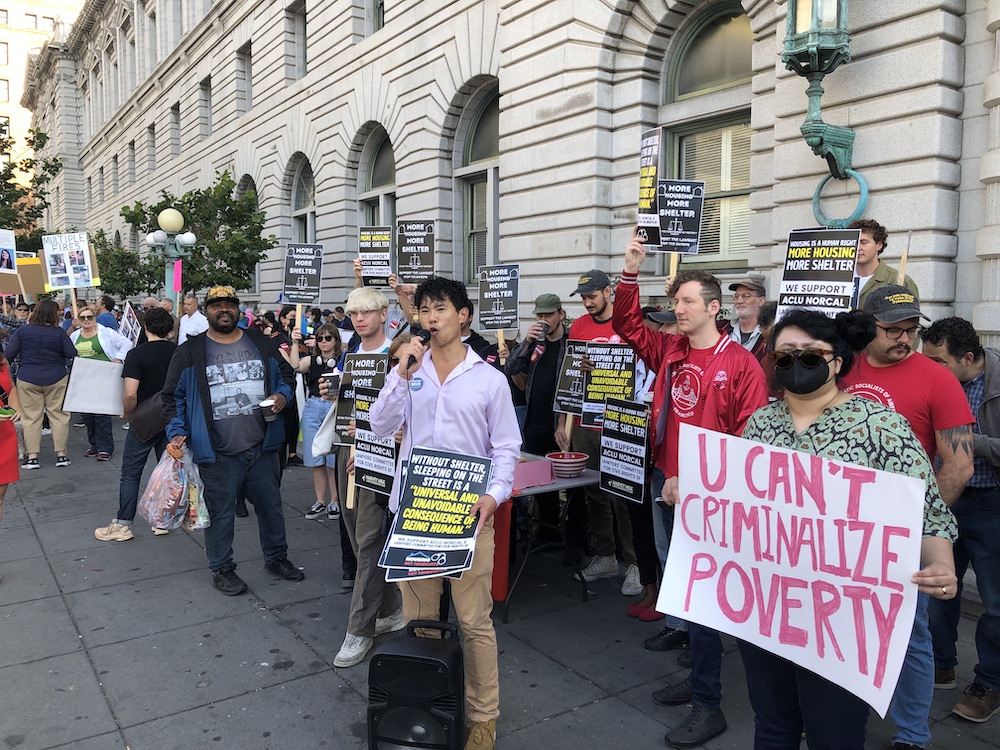A federal appeals court has refused to lift the injunctions that bans San Francisco from conducting sweeps of homeless encampments when there’s no place for people to go.
The terse statement reads as follows:
Because the parties agree that a person is not involuntarily homeless if they have declined a specific offer of available shelter or otherwise have access to such shelter or the means to obtain it, and because the district court has denied the plaintiffs’ motion to enforce the injunction, the City’s motion to modify the preliminary injunction is DENIED WITHOUT PREJUDICE. The court will address all the other issues raised by the appeal in due course.
What that means isn’t a simple as it seems. City Attorney David Chiu says the ruling is, ironically, a victory for the city, since it appears to allow sweeps of people who refuse the offer of shelter.

But Zal Shroff, acting legal director of the Lawyers Committee for Civil Rights, argued that the ruling keeps the injunction in place:
“The Ninth Circuit’s ruling makes clear what the law has always been: San Francisco cannot punish people who lack access to specific and realistically available shelter. The injunction is in place because San Francisco failed that test by citing, fining, and arresting unhoused people who did not have a clear means to access shelter more than 3,000 times over the last several years.”
Here’s the real issue: Is any offer of shelter okay—or does it have to be, as Shroff says, “realistically available shelter?”
According to the original lawsuit, city officials, starting with the mayor, routinely order workers to “resolve” encampments by taking the possessions of unhoused people, including not just tents but blankets and survival equipment and in some cases prescription drugs and important personal papers, and destroying them. Those people, the lawsuit argues, are not always offered shelter—and when an offer is made, that shelter bed is either not available or available only for a very short time.
And accepting a shelter bed means splitting up couples, giving up pets, and giving up most of your belongings, since the crowded shelters don’t have adequate storage space.
The judges insist that there’s no disagreement on the definition of “involuntary homelessness,” and the plaintiffs have always agreed that a person who has the means to live inside, or a person who is given a realistic offer of available shelter, isn’t involuntarily homeless.
Help us save local journalism!
Every tax-deductible donation helps us grow to cover the issues that mean the most to our community. Become a 48 Hills Hero and support the only daily progressive news source in the Bay Area.
But as the city begins sweeps again—and according to Chiu’s interpretation, that’s going to happen—the courts, which are still considering this case at both the trial court and the appellate level, are going to have to deal with the question of what is “realistically available shelter,” when the waiting list for shelter has more than 400 names on it, and there are thousands more people living on the streets than available shelter beds.
Are “available” beds slots that are open because someone who slept there the night before didn’t come back to the line in time to sign up again? That person, of course, is now homeless; does the city want to say they are “involuntarily” homeless because they couldn’t get to the right line at the right time?
Is it realistic to say that the city is offering stable, not just one-night, shelter to thousands of people on the streets when the shelters are already at full capacity?
So far, Judge Donna Ryu has refused to appoint a special master to oversee enforcement of the injunction. But I suspect that the sweeps will be back, in force, in the next few weeks, and this will again end up in federal court.




